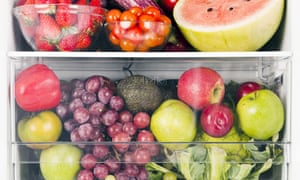Eating foods high in flavonoids, such as apples, berries and peppers, may prevent long-term weight gain, research suggests.
Fruit and vegetables including blueberries, apples and onions contain high levels of a naturally occurring compound that could help prevent weight gain, a large study has found.
 Researchers studied 124,086 US men and women, who were followed for
up to 24 years, and found that eating more fruit and vegetables
containing flavonoids was associated with a small but potentially
significant reduction in weight gain.
Researchers studied 124,086 US men and women, who were followed for
up to 24 years, and found that eating more fruit and vegetables
containing flavonoids was associated with a small but potentially
significant reduction in weight gain.Flavonoids are plant compounds found in various foods and drinks, including tea, chocolate and wine. Because they are rich in antioxidants they are thought to help prevent cell damage.
The researchers, from Harvard and the University of East Anglia (UEA), suggest in a paper published in the BMJ on Wednesday that they may also be able to help prevent obesity and associated problems. However, as it is purely an observational study, no causal effect can be established.
Prof Aedin Cassidy, of UEA’s Norwich Medical School, said: “There’s a lot of interest in flavonoids with cardiovascular health and diabetes. We think the different subclasses [of flavonoids] have different effects.
“A lot of people, when they go on a diet, have to do something radical. This is basically saying that something which is good for you already may also be good for weight maintenance, particularly in middle age when weight gain is associated with increased chance of getting heart disease and strokes.”
Participants were drawn from three different US studies. One featured men with an average age of 47, while the two others were women-only with average ages of 36 and 48 respectively.
The participants self-reported their weight, lifestyle habits and any recently diagnosed diseases via questionnaires every two years between 1986 and 2011. In addition, they self-reported their diet every four years and on that basis the association between their dietary intake of seven flavonoid subclasses and weight change was analysed. Results, which were adjusted for a range of dietary and lifestyle factors, were consistent across men and women, and different ages.
The greatest association was found for anthocyanins, flavonoid polymers and flavonols. Blueberries and strawberries were the main source of anthocyanins, tea and apples were the main source of flavonoid polymers and tea and onions the main source of flavonols. Men gained on average a kilo over a four-year period and women gained a couple of kilos, but those with higher consumption of certain flavonoids did not put on weight.
Each small increase (standard deviation) of daily intake, for example 10mg of anthocyanins, was associated with 0.16-0.23lbs (0.07-0.10kg) less weight gained over four-year intervals. But a single serving per day of many fruits could potentially have a greater impact. For example, half a cup of blueberries provides about 121mg – or about 12 standard deviations – of anthocyanins.
The authors suggest that eating fruit and vegetables with high levels of flavonoids, such as apples, pears, berries and peppers, may therefore be a valuable tool in preventing obesity.
Previous research has suggested flavonoid subclasses may decrease energy intake, decrease fat absorption or increase glucose uptake in muscle.
Naveed Sattar, professor of metabolic medicine at the University of Glasgow, said caution should be employed in interpreting the results. “In truth, individuals who eat more high-flavonoid foods have other habits which lead them to put on less weight – or other effects of high-flavonoid foods may be responsible, such as fibre content in fruits and vegetables. Hence, one must be very careful about recommending high-flavonoid foods as beneficial to health.
“Our lab conducted a recent randomised-placebo controlled trial of polyphenol/flavonoid-rich drinks and saw no effect over the short term (one month) on markers linked to heart disease or diabetes, and longer-term trials are needed to prove effects on weight.”
Source:


No comments:
Post a Comment